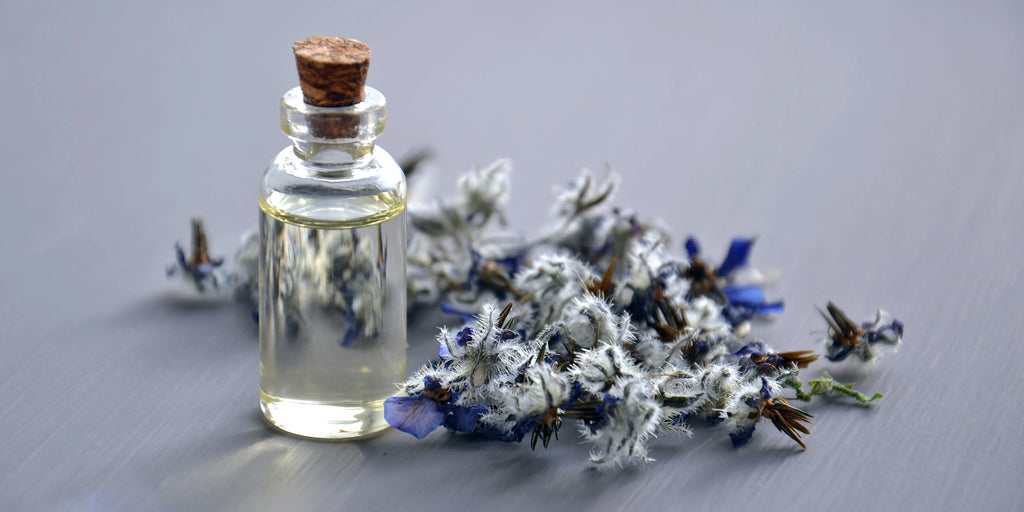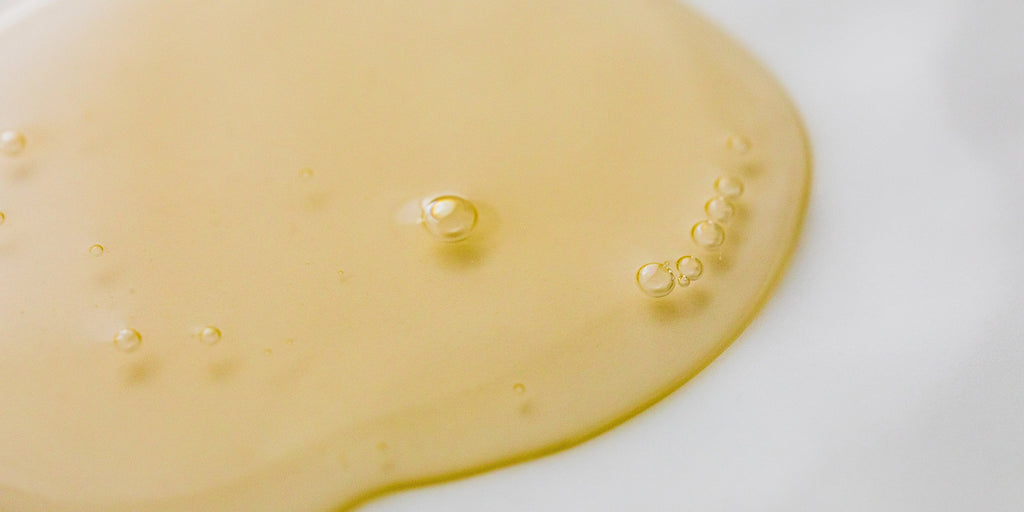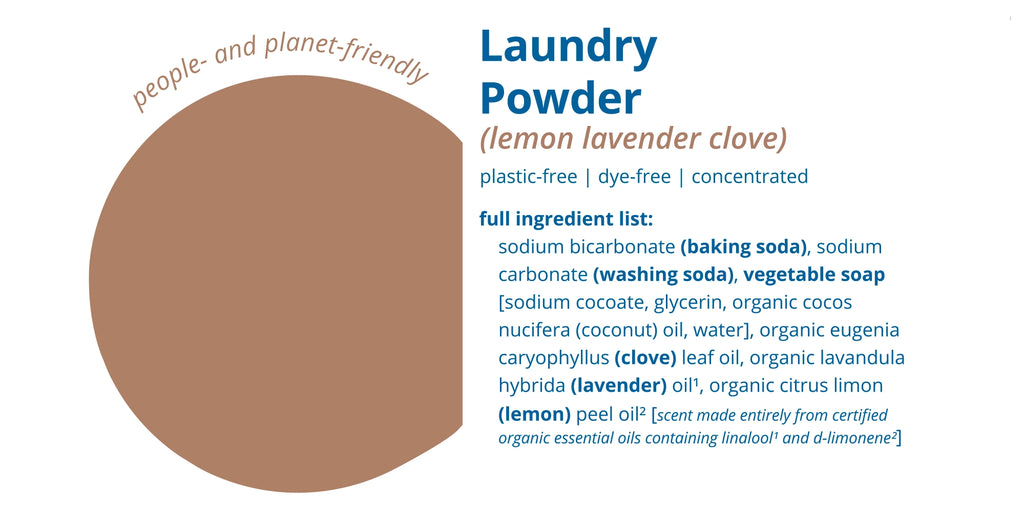Organic Essential Oils: Meet Your Ingredient

Ingredients are the cornerstone of our products and our business. We strive to use ingredients and formulas that are safer for people and the environment. We consider the entire ingredient lifecycle, from sourcing and manufacturing to use and disposal. Third-party certifications from MADE SAFE® and Leaping Bunny hold us accountable and help us identify ingredients that align with our standards. We list every ingredient we use on the label of each product and on our website.
Our Meet Your Ingredient series is our effort to provide additional information about our products so you can make informed decisions. This entry is all about organic essential oils, which we use to make scented varieties of our products.
What are essential oils?
Essential oils are concentrated plant extracts. They can be derived from a wide variety of plants and plant parts, including flowers, leaves, bark, seeds, roots, and twigs. The chemical composition varies based on the plant and which part of the plant is used. For example, clove essential oil can be extracted from buds, stems, or leaves. Each type of oil may have variations in color, scent, and other properties.
How are essential oils made?
Essential oils are made by extracting the aromatic oil from plants. There are numerous extraction methods, but steam distillation is the most common. This method uses steam to release essential oils from raw plant materials, creating a vapor made of water and essential oils. The vapor passes through a condenser that cools it back into liquid form, which then collects in a separator. Since oil and water don’t mix, the essential oil naturally separates from the water and is siphoned off.
Other extraction methods include solvent extraction, CO2 extraction, maceration, enfleurage, cold-press extraction, and water distillation.
What are essential oils used for?
Essential oils are used in manufacturing to add or enhance scents and flavors in soaps, detergents, cosmetics, food products, and more. They are also commonly used in aromatherapy and holistic medicine for their perceived health benefits.
At Meliora Cleaning Products, we use organic essential oils to make the scented versions of our products. Below you will find a list of each essential oil we use and the products that contain them. We always offer every product we make in an unscented base formula that is free of essential oils.

Photo credit: Karolina Grabowska
Health impact of essential oils
Essential oils are used in cleaning products as a safer alternative to synthetic fragrances. According to Women’s Voices for the Earth, thousands of synthetic chemicals are used to add scent to cleaning products. Many of these chemicals have been linked to human health issues, including eye and skin irritation, hormonal imbalances, and increased risk of breast cancer. Among these chemicals are carcinogens, reproductive toxins, neurotoxicants, and skin allergens. Moreover, manufacturers are not required to disclose the synthetic fragrance ingredients they use, even under California’s Cleaning Products Right to Know Act. If you see “synthetic fragrances” on an ingredient list, it could include any number of these thousands of potentially harmful ingredients.
We never use synthetic fragrances or hidden fragrance ingredients
Essential oils are a plant-derived alternative to synthetic fragrance ingredients. While “natural” doesn’t necessarily mean “safe”, most essential oils are safe for most people when used properly. Because they are ultra-concentrated, essential oils are safest when diluted. We follow IFRA guidelines for the maximum use of essential oils in various products to ensure they are well diluted.
Some people may be allergic to certain essential oils and experience skin irritation, headaches, exacerbated asthma, and other health effects. If you believe that you or someone in your home may be sensitive to essential oils, it’s best to avoid any products that contain them. We offer an unscented version of every product we make so as many people as possible can enjoy them, regardless of sensitivities to essential oils. In addition, we call out common allergens present in essential oils specifically on our labels. This includes limonene and linalool.
All of our scented products are clearly labeled:
- Every ingredient, including essential oils, is listed on the product label and on our website.
- If a product is scented, the name of the scent is listed directly below the product name on the label.
- Scented products are color-coded: blue for unscented, purple for lavender, yellow for lemon, brown for lemon-lavender-clove, bright green for lemongrass, red for peppermint, and dark green for tea tree and peppermint-tea tree.

Environmental impact of essential oils
Essential oil production requires a lot of raw plant material. The amount needed may vary based on the type of plant, environmental conditions, extraction method, and more. Regardless, the process is resource intensive: Earth Island Journal estimates that 250 pounds of lavender are required to produce a single pound of essential oil.
Because so many plants are needed, how they are farmed is especially important when sourcing essential oils. Most essential oils are produced from plants grown on large corporate farms that tend to use pesticides and herbicides. Plants that are grown outside of their native climate tend to require synthetic chemicals, artificial climate control, and additional water, all of which are additional resources that can have environmental costs. Meanwhile, some plants that are harvested in the wild, including sandalwood, rosewood, and cedarwood, are overharvested despite being listed as endangered.
As much as possible, we source essential oils produced in countries where the plants are native: lavender from Spain, lemon from Italy, clove from Sri Lanka, peppermint and lemongrass from India, and tea tree from China. We avoid using essential oils derived from endangered plants.
We use certified organic essential oils
We use only organic essential oils to scent our products. If you check the ingredients listed on the label, you will see them labeled as such: for example, “organic lavandula hybrida (lavender) oil.”

So why don’t we include an organic seal on our products? The term “organic” refers to a set of agricultural standards that promote sustainability and minimize synthetic practices. The USDA organic standards, for example, “foster cycling of resources, promote ecological balance and conserve biodiversity” while restricting the use of synthetic fertilizers, sewage sludge, irradiation, and genetic engineering.
The USDA has four distinct organic labels for products: 100 percent organic, organic, made with organic ingredients, and specific organic ingredients. Each label is based on what percentage of the ingredients in a product are certified organic.
Only agricultural products, including plant-derived oils, can be considered organic. Non-agricultural products, such as mineral-derived ingredients like baking soda and washing soda, cannot be organic. This means that cleaning products that use both organic ingredients and non-agricultural ingredients may be labeled as “made with organic ingredients” or list specific organic ingredients, but cannot be labeled (or certified) as organic or 100 percent organic.
Our cleaning products use these essential oil ingredients:
|
Organic Lavender Essential Oil |
|
Also known as: Lavandula Hybrida Grosso Oil INCI Name: Organic Lavandula Hybrida Grosso Essential Oil CAS Number: 8022-15-9 Products with Organic Lavender Essential Oil:
|
|
Organic Lemon Essential Oil |
|
Also known as: Citrus Medica Limonum Oil, Lemon Peel Oil INCI Name: Organic Citrus Medica Limonum Peel Oil CAS Number: 8008-56-8 Products with Organic Lemon Essential Oil:
|
|
Organic Clove Essential Oil |
|
Also known as: Eugenia Caryophyllus Oil, Clove Bud Oil INCI Name: Organic Eugenia Caryophyllus Bud Oil CAS Number: 8000-34-8 Products with Organic Clove Essential Oil: |
|
Organic Peppermint Essential Oil |
|
Also known as: Mentha Piperita Oil, Peppermint Leaf Oil INCI Name: Organic Mentha Piperita Leaf Oil CAS Number: 8006-90-4 Products with Organic Peppermint Essential Oil: |
|
Organic Lemongrass Essential Oil |
|
Also known as: Cymbopogon Flexuosus Oil INCI Name: Organic Cymbopogon Flexuosus Oil CAS Number: 91844-92-7 Products with Organic Lemongrass Essential Oil: |
|
Organic Tea Tree Essential Oil |
|
Also known as: Melaleuca Alternifolia Oil, Tea Tree Leaf Oil INCI Name: Organic Melaleuca Alternifolia Oil CAS Number: 68647-73-4 Products with Organic Tea Tree Essential Oil: |
Cover photo by Mareefe

